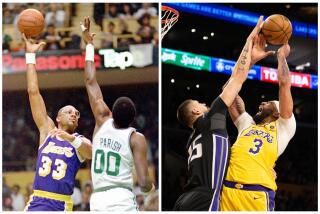This Idea Doesn’t Sell With Some Eye Specialists
- Share via
There was a time when athletes’ endorsement deals were predictable.
Shoes. Sports equipment. Beverages. Cars.
Then you see the caddie for Fred Funk pick up a golf bag emblazoned with the words Whitten Laser Eye, the same words Funk wears on the sleeve of his shirt.
Funk underwent a LASIK procedure performed by Dr. Mark Whitten in suburban Washington in 1998. Two days later, he shot a first-round 64 at the Kemper Open and went on to lead the tournament for three rounds.
Funk and Whitten have become good friends, one reason for the sponsorship arrangement. Funk also has been featured on a poster for TLC Laser Eye Centers, the Canadian-based company that operates more than 50 vision correction centers across North America, including a number in Southern California.
TLC recently landed bigger prey than Funk: Tiger Woods, who underwent a LASIK procedure performed by Whitten in October.
TLC announced in February Woods has signed a multiyear agreement to be a spokesperson for the company.
From the news release: “When I recall how poor my eyesight was my entire life, I feel like I’ve experienced a miracle,” Woods said. “And it only took 20 minutes!”
But some eye surgeons are concerned about the use of athletes to promote a surgical procedure.
“It’s all marketing,” said Brian S. Boxer Wachler, director of the UCLA Laser Refractive Center at the Jules Stein Eye Institute. “It gives me a concern about the way refractive surgery is being marketed.
“It implies it’s some reproducible product wherever you go: Here’s LASIK. But LASIK is not the same as buying a TV. It’s not a product. Ninety-five percent of it depends on the doctor, not the equipment.
“[TLC] provides the framework, but there are so many different doctors. The doctor who did Tiger Woods obviously is very good. That’s one doctor in the TLC organization. Are the other doctors at the same level? I don’t know.”
Dr. Alan Kozarsky, the Atlanta eye surgeon who operated on Braves pitcher Greg Maddux, doesn’t approve of using athletes to endorse the procedure and didn’t negotiate a deal with Maddux.
“Marketing and promotion has its limits,” Kozarsky said. “There’s going to be a person who walks in and isn’t an informed patient and becomes part of the 5% [who experience complications] or the less than 1% [whose vision is diminished by the surgery.] That person isn’t going to be happy.”
Gary Jonas, executive vice president of strategic growth for TLC Laser Eye Centers, doesn’t suggest laser eye surgery will help your golf game. This isn’t a new set of irons or a Great Big Bertha.
But TLC has a strategy of promoting sports figures who have had laser eye surgery, more so than other celebrities.
“For athletes, especially in particular sports, vision is an important part of success,” Jonas said. “A movie star, Sharon Stone or Julianne Moore, what does it mean if she sees 20/20 or 20/15? It doesn’t make them any more or less of an actress.”
The first athlete to have a relationship with TLC was Derrick Adkins, a gold-medal winning Olympic hurdler who had the surgery after complaining about a contact lens being out of position during a race.
The slogan on the poster TLC produced: “Gold Medal Legs. 20/20 Eyes.”
Olympic gold medal swimmer Amy Van Dyken was next, followed by Funk.
“20/20 Eyes,” the poster proclaimed. “Zero Handicap.”
“People who are blessed with good vision are really lucky,” Funk said. “At Augusta on No. 13 on Saturday, the pollen was getting ripped out of the trees, yellow stuff was flying around. Someone with contacts can’t take that.”
So if you wear contacts and you’ve got game, you might get a deal on laser eye surgery, which usually costs about $5000 for both eyes.
“Certainly there are people we’ve done for free,” Jonas said. “We don’t want the word out. We don’t do everyone free. It depends on the person.”
More to Read
Go beyond the scoreboard
Get the latest on L.A.'s teams in the daily Sports Report newsletter.
You may occasionally receive promotional content from the Los Angeles Times.










